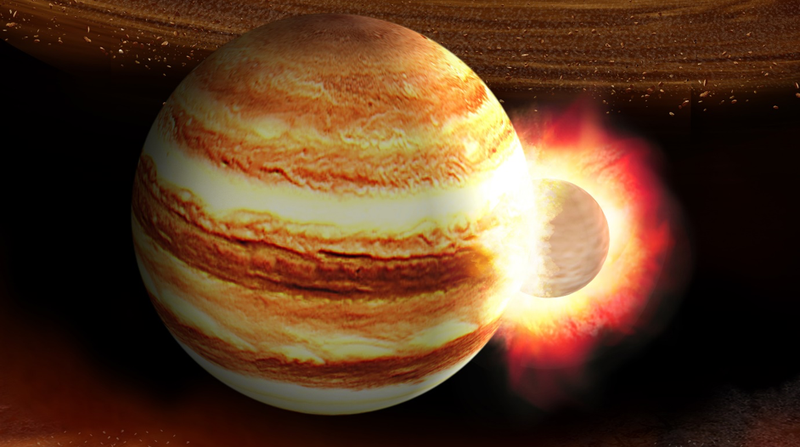
Jupiter’s core seems off, astronomers think, in a way explainable by an ancient collision with another enormous body, perhaps one 10 times the mass of Earth.
A collision early in our solar system’s history shouldn’t be a huge surprise; after all, scientists surmise that Earth’s own Moon resulted from a giant impact. A similar event might have been responsible for some unexpected properties of Jupiter’s core, which seems strangely low-density yet high in heavy elements.
NASA’s Jupiter-orbiting Juno mission has been able to record the planet’s gravitational field in enough detail for scientists to figure out what things are like inside the gas giant. It appears that, rather than a very dense central core with less-dense surroundings, the planet’s core might actually be more diffuse, but with lots of heavy elements.
Researchers in the United States, China, Japan, and Switzerland wondered how such a planet could come to be—it goes against most models of planetary formation, according to the paper published in Nature. But there’s a hypothesis that might explain the results.: a giant impact during Jupiter’s early days.
Advertisement
The solar system formed from a dust disk surrounding the Sun, which coalesced into the planets and other objects. During this time, a planet like Jupiter would have grown quickly, and rather suddenly (on cosmic timescales) exerted lots of gravity on the surrounding planets. Perhaps, as a result, a smaller nearby proto-planet would have collided with Jupiter—and indeed, the researchers’ models of Jupiter’s formation, plus the collision, predict the conditions to form a planet that looks the way they understand Jupiter to look.
And the collision wouldn’t have been a glancing blow with some mass that Jupiter slowly engulfed, according to the paper; that wouldn’t generate enough shock waves to disrupt Jupiter’s core. The hypothetical object would have to smash into Jupiter head-on.
Advertisement
It’s certainly a provocative hypothesis. “We have good evidence that planetary collisions have shaped out solar system (the formation of Earth’s moon, the removal of much of Mecury’s rock, and potentially for rolling Uranus onto it’s side),” Jonathan Fortney, planetary scientist at the University of California, Santa Cruz not involved in the study, told Gizmodo in an email. “This idea is very much in that same spirit, although scaled up immensely in size and scale. Imagine something perhaps like Uranus or Neptune plowing directly into Jupiter!”
But it’s just a hypothesis. “I’m not convinced (yet) that it is the correct answer to this question,” Fortney said, “but we can add it to the list of interesting explanations that need to be explored in more detail going forward.” And continuing to devise scenarios is important to explain the planet’s strange interior, Yamila Miguel, assistant professor at Leiden Observatory in the Netherlands, told Gizmodo.
Advertisement
So, while a ginormous smashup isn’t a sure thing, it is definitely fun to think about.
Bagikan Berita Ini














0 Response to "A Baby Planet Might Have Smashed Right Into Young Jupiter - Gizmodo"
Post a Comment